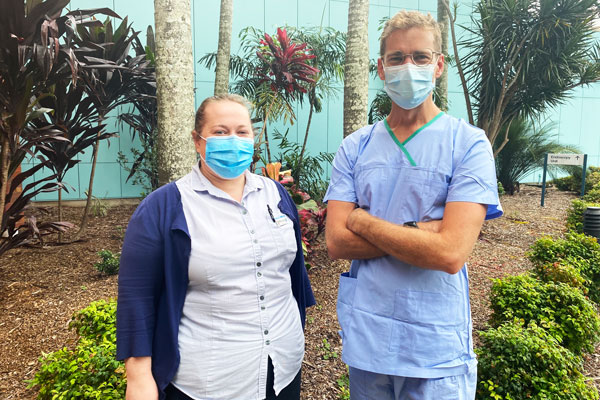
Some members of the new virtual lung nodule clinic team, Melanie Holland – Lung Lesion Diagnostic Nurse, and Dr Gerry Olive, Thoracic Physician.
A new virtual multidisciplinary team within TPCH’s Core Thoracic Medicine Service is endeavouring to streamline the diagnosis and management pathway of patients with lung nodules.
The team, which includes thoracic physicians, radiologists, radiation oncologists and surgeons, as well as nursing and administrative support has been formed to support the service’s virtual lung nodule clinic which allows patients with lung nodules to be monitored and managed without coming to hospital.
The virtual lung nodule clinic was envisioned prior to the start of the pandemic and received Metro North Link/SEED funding in recognition of the comparative benefits of telehealth to face-to-face consultations in the management of lung nodules and suspected early lung cancer.
Results of the research have shown that the use of telehealth in lung cancer diagnosis was well accepted by patients, with significant cost savings, especially for those referred from out of catchment. This platform has allowed the team to extend the approach to lung nodule diagnosis more broadly.
TPCH Thoracic Physician and PhD candidate, Dr Gerry Olive said as people get older, lung nodules become more common – both benign and malignant Therefore, it is important to know how to manage and treat these.
“We know that the progress of lung nodules is best monitored through diagnostic imaging including CT scans and/or PET scans, and these results can easily and effectively be conveyed back to the patient via telehealth,” Dr Olive said.
“Often patients have had cross-sectional imaging at a variety of places, arranged by various providers. While some imaging may be quite old, it can provide very useful information about changes over time.
“By the time the patient reaches our team at TPCH, it can be challenging to bring together all the relevant clinical information to make informed decisions about their course of treatment.
“With a multidisciplinary team that meets virtually, we can collate this to make a grounded judgement on how the nodules are behaving, without the need to meet in person.
“This streamlined approach, and our team’s expertise, means we can form recommendations including surveillance intervals, the feasibility of biopsy, and treatment options. This is collated to provide clear and timely communication back to other providers involved in the patient’s care, including the referring specialist.
“This hopefully means less diagnostic delay, reduced anxiety for the patient, and faster treatment initiation for those nodules diagnosed as cancer.
“It also means greater convenience for the patient and less burden on the health care system, as the patient does not always have to attend the hospital in person to see a clinician and discuss their condition.”